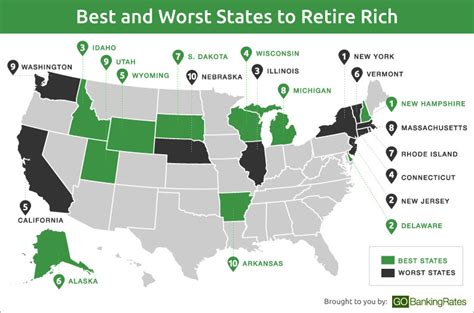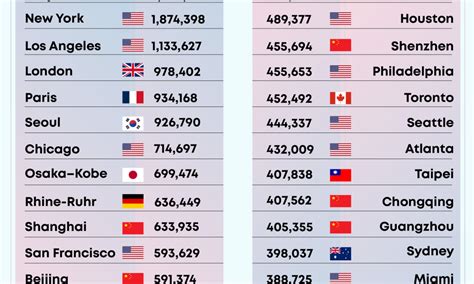
Retirees seeking financial havens should consider states with exceptionally low property taxes and a reasonable cost of living, offering a pathway to a richer retirement. Thirteen states, in particular, stand out for their appealing combination of affordability and minimal property tax burdens.
Many seniors face challenges in retirement due to rising costs and fixed incomes. States with low or near-zero property taxes can significantly alleviate these financial pressures, allowing retirees to stretch their savings further and enjoy a more comfortable lifestyle. This article explores thirteen such states, highlighting their property tax advantages, cost of living, and other factors that make them attractive retirement destinations.
States with Attractive Financial Profiles for Retirees
Several states across the U.S. offer retirees a unique blend of low property taxes and a manageable cost of living. These states include:
-
Hawaii: While not traditionally considered a low-cost destination, Hawaii offers a property tax relief program for seniors that can substantially reduce their tax burden. The state’s natural beauty and relaxed lifestyle are additional draws. “Hawaii has one of the lowest effective property tax rates in the U.S.,” making it surprisingly affordable for some retirees.
-
Alabama: Alabama boasts some of the lowest property taxes in the nation, combined with a low cost of living. This makes it an attractive option for retirees on a fixed income. The state also offers a welcoming climate and various recreational opportunities.
-
Louisiana: Louisiana’s low property taxes and overall cost of living make it a fiscally sound choice for retirees. The state’s rich culture, unique cuisine, and vibrant music scene add to its appeal.
-
Wyoming: Wyoming features very low property taxes and no state income tax, making it a haven for retirees seeking to minimize their tax liabilities. The state’s stunning landscapes and outdoor recreational opportunities are a major draw.
-
Colorado: While certain areas can be expensive, Colorado provides some regions with relatively low property taxes compared to the national average, especially outside major metropolitan areas. The state’s active lifestyle and beautiful scenery attract many retirees.
-
Delaware: Delaware offers low property taxes and no state sales tax, which can significantly reduce the overall cost of living for retirees. The state’s proximity to major East Coast cities is an added advantage.
-
South Carolina: South Carolina has a low cost of living and relatively low property taxes, making it a popular retirement destination. The state’s mild climate, beautiful beaches, and charming towns are major draws.
-
West Virginia: West Virginia offers extremely low property taxes and one of the lowest costs of living in the United States. This makes it an attractive option for retirees looking to maximize their savings. The state’s natural beauty and outdoor recreational opportunities are also appealing.
-
Arkansas: Arkansas features low property taxes and a low cost of living, making it a financially sound choice for retirees. The state’s natural beauty and outdoor recreational opportunities are significant attractions.
-
Montana: Similar to Wyoming, Montana has low property taxes and no state sales tax in addition to beautiful landscapes. While some areas are becoming more expensive, strategic location choices can make it affordable.
-
Idaho: Idaho’s property taxes are relatively low, and its cost of living is manageable in many areas, especially outside the Boise metropolitan area. The state’s stunning scenery and outdoor recreational opportunities are major draws.
-
Nevada: Nevada’s low property tax rates, coupled with no state income tax, are attractive for retirees seeking financial advantages. However, the cost of living can vary significantly depending on the location.
-
Utah: Utah presents a blend of moderate property taxes and a growing economy, making it an attractive option for retirees seeking a balance between affordability and access to amenities. The state’s stunning natural landscapes and outdoor activities are also significant draws.
Detailed State Analysis and Tax Benefits
To fully appreciate the advantages these states offer, it is crucial to examine their specific tax benefits and cost-of-living considerations.
Hawaii:
Hawaii, while perceived as expensive, has a property tax system that can benefit seniors. The state’s “low effective property tax rates” result from generous exemptions and credits available to homeowners, particularly those over 65. While the initial cost of housing can be high, the reduced property tax burden can offset some of these expenses over time. The median property tax in Hawaii is relatively low compared to the home value.
Alabama:
Alabama’s low property taxes are a significant draw for retirees. The state constitution limits property taxes, resulting in some of the lowest rates in the country. Furthermore, Alabama offers a homestead exemption for seniors, further reducing their property tax burden. The state’s overall cost of living is also below the national average, making it a financially attractive option. The median property tax is about $894 per year.
Louisiana:
Louisiana’s low property taxes are complemented by a homestead exemption, which further reduces the tax burden for homeowners. The state’s cost of living is also below the national average, making it an affordable retirement destination. Moreover, Louisiana offers various tax breaks for seniors, enhancing its appeal.
Wyoming:
Wyoming’s tax-friendly environment is a major draw for retirees. The state has no state income tax, and its property taxes are among the lowest in the nation. This combination allows retirees to keep more of their income. The state’s stunning natural beauty and outdoor recreational opportunities are additional benefits. The median property tax is approximately $2,168 per year.
Colorado:
While Colorado’s cost of living can be high in certain areas, some regions offer relatively low property taxes. The state also provides a property tax exemption for seniors who meet certain income and residency requirements. This exemption can significantly reduce their tax burden. Colorado’s active lifestyle and beautiful scenery attract many retirees.
Delaware:
Delaware offers a combination of low property taxes and no state sales tax, making it an attractive option for retirees. The state also provides a property tax credit for seniors, further reducing their tax burden. Delaware’s proximity to major East Coast cities is an added advantage.
South Carolina:
South Carolina’s low cost of living and relatively low property taxes make it a popular retirement destination. The state also offers a homestead exemption for seniors, reducing their property tax burden. South Carolina’s mild climate, beautiful beaches, and charming towns are major draws.
West Virginia:
West Virginia offers some of the lowest property taxes and the lowest cost of living in the United States. This makes it an attractive option for retirees looking to maximize their savings. The state’s natural beauty and outdoor recreational opportunities are also appealing. “West Virginia’s low cost of living is also attractive for those on a fixed income,” making it a great choice.
Arkansas:
Arkansas features low property taxes and a low cost of living, making it a financially sound choice for retirees. The state also offers a homestead exemption for seniors, reducing their property tax burden. Arkansas’ natural beauty and outdoor recreational opportunities are significant attractions.
Montana:
Montana, similar to Wyoming, has low property taxes and no state sales tax. The state’s stunning landscapes and outdoor recreational opportunities are major draws. While some areas are becoming more expensive, strategic location choices can make it affordable.
Idaho:
Idaho’s property taxes are relatively low, and its cost of living is manageable in many areas, especially outside the Boise metropolitan area. The state’s stunning scenery and outdoor recreational opportunities are major draws.
Nevada:
Nevada’s low property tax rates, coupled with no state income tax, are attractive for retirees seeking financial advantages. However, the cost of living can vary significantly depending on the location.
Utah:
Utah presents a blend of moderate property taxes and a growing economy, making it an attractive option for retirees seeking a balance between affordability and access to amenities. The state’s stunning natural landscapes and outdoor activities are also significant draws.
Cost of Living Considerations
While low property taxes are a significant advantage, retirees must also consider the overall cost of living in these states. Factors such as housing costs, healthcare expenses, transportation costs, and food prices can significantly impact a retiree’s budget.
States like Alabama, Louisiana, Arkansas, and West Virginia generally have a lower cost of living compared to the national average. This means that retirees can stretch their savings further in these states. Conversely, states like Hawaii and Colorado can have a higher cost of living, particularly in urban areas. Retirees should carefully research the cost of living in specific locations within these states to ensure they can afford to live comfortably.
Healthcare Access and Quality
Access to quality healthcare is a critical consideration for retirees. States with strong healthcare systems and a wide range of medical facilities are generally more attractive retirement destinations.
States like Hawaii, Colorado, and Delaware tend to have higher-quality healthcare systems, although the cost of healthcare can be higher in these states. States like West Virginia and Arkansas may have lower healthcare costs but may also have limited access to specialized medical care in certain areas.
Community and Lifestyle
Retirees should also consider the community and lifestyle offered by each state. Factors such as the availability of recreational activities, cultural events, and social opportunities can significantly impact a retiree’s quality of life.
States like Colorado, Montana, and Idaho offer abundant outdoor recreational opportunities, such as hiking, skiing, and fishing. States like Louisiana and South Carolina offer a rich cultural heritage and vibrant social scene. Retirees should choose a state that aligns with their interests and preferences.
Tax Planning and Financial Advice
Retiring in a state with low property taxes can be a smart financial move, but it is essential to consult with a financial advisor to develop a comprehensive retirement plan. A financial advisor can help retirees assess their financial situation, determine their retirement goals, and develop a strategy to achieve those goals.
Tax planning is also crucial. Retirees should understand the tax implications of living in a particular state, including state income taxes, sales taxes, and estate taxes. A tax advisor can help retirees minimize their tax liabilities and maximize their retirement income.
Real Estate Market Trends
Understanding the real estate market trends in these states is crucial for retirees planning to purchase property. Factors such as housing prices, inventory levels, and interest rates can significantly impact the affordability of housing.
States like Alabama, Louisiana, and Arkansas generally have more affordable housing markets compared to states like Hawaii and Colorado. However, housing prices can vary significantly within each state, depending on the location. Retirees should research the real estate market in specific areas to ensure they can find a home that fits their budget and lifestyle.
Economic Stability and Job Opportunities
While most retirees are not seeking employment, the economic stability of a state can impact its overall attractiveness. States with strong economies and diverse job markets tend to be more resilient to economic downturns.
States like Colorado, Utah, and Nevada have relatively strong economies and growing job markets. States like West Virginia and Arkansas may have slower economic growth, but they also offer a lower cost of living.
Climate and Weather
Climate and weather are essential considerations for retirees. Some retirees prefer warm climates with mild winters, while others prefer cooler climates with distinct seasons.
States like Hawaii, South Carolina, and Nevada offer warm climates with mild winters. States like Colorado, Montana, and Wyoming offer cooler climates with distinct seasons. Retirees should choose a state with a climate that suits their preferences.
Community Resources and Support Services
Access to community resources and support services is also crucial for retirees. This includes access to senior centers, transportation services, healthcare facilities, and social programs.
States with strong community resources and support services are generally more attractive retirement destinations. Retirees should research the availability of these resources in specific areas to ensure they can access the support they need.
Frequently Asked Questions (FAQ)
-
What are property taxes, and how do they affect retirees?
Property taxes are taxes levied by local governments on real estate. They are a significant expense for homeowners, and retirees on fixed incomes can find them particularly burdensome. States with low property taxes can significantly reduce this financial strain, allowing retirees to stretch their savings further.
-
Which states have the lowest property taxes in the U.S.?
According to the analysis, states with some of the lowest property taxes include Alabama, Louisiana, West Virginia, Wyoming, and Hawaii (with senior exemptions). These states offer retirees a significant financial advantage by minimizing their property tax burden.
-
Is it only property taxes that retirees should consider when choosing a state?
No, while low property taxes are a significant factor, retirees should also consider the overall cost of living, healthcare access and quality, community and lifestyle, state income taxes, sales taxes, access to community resources, climate and weather, and the real estate market trends in the area. A holistic approach to financial planning is essential for a comfortable retirement.
-
How does the cost of living vary among these states?
The cost of living varies significantly. States like Alabama, Louisiana, Arkansas, and West Virginia generally have a lower cost of living compared to the national average. Conversely, states like Hawaii and Colorado can have a higher cost of living, particularly in urban areas. Careful research into specific locations is crucial.
-
Should I consult with a financial advisor before making a decision?
Yes, consulting with a financial advisor is highly recommended. A financial advisor can help you assess your financial situation, determine your retirement goals, and develop a strategy to achieve those goals. They can also provide valuable insights into tax planning, investment strategies, and other financial considerations relevant to retirement.
Conclusion
Choosing the right state to retire in is a significant decision with long-term financial implications. States with low property taxes and a reasonable cost of living can offer retirees a pathway to a richer retirement. By carefully considering the factors discussed in this article, retirees can make an informed decision and find a state that meets their financial needs, lifestyle preferences, and healthcare requirements. Consulting with a financial advisor and conducting thorough research are essential steps in the retirement planning process. The states highlighted offer a diverse range of options for retirees seeking financial security and a fulfilling retirement experience.
Careful planning and consideration of these factors are crucial to ensuring a comfortable and financially secure retirement. Each state offers a unique blend of benefits and challenges, and retirees should weigh their options carefully before making a decision.









